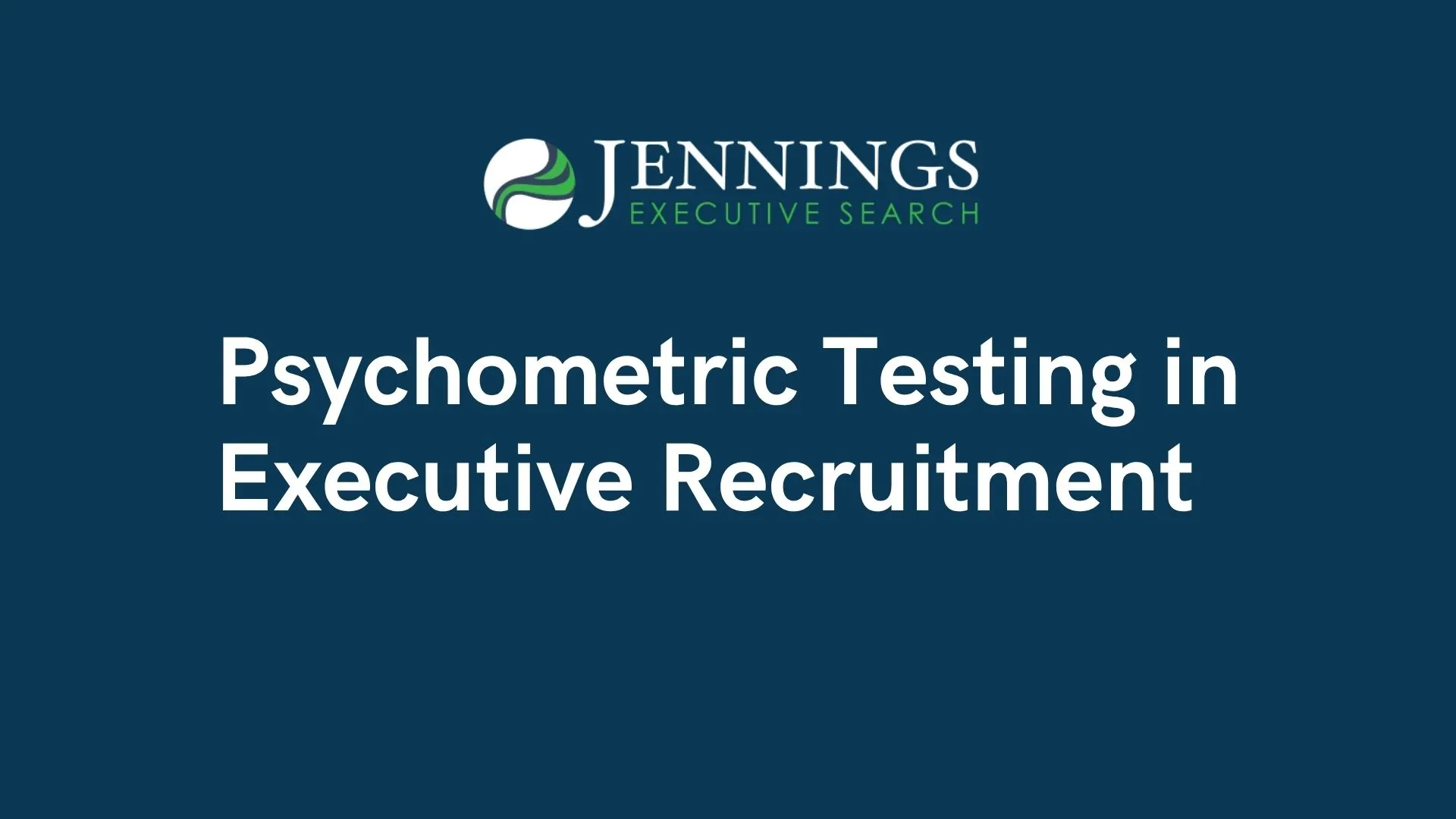Psychometric Testing in Executive Recruitment
Uncover the power of psychometric testing in executive recruitment with our comprehensive guide.

In today's competitive business world, finding the right executive talent is crucial for organizational success. Companies are constantly searching for innovative and effective strategies to identify candidates who possess the necessary skills, knowledge, and attributes for leadership positions. One such strategy gaining popularity is psychometric testing in executive recruitment. This powerful tool helps organizations gain valuable insights into a candidate's psychological profile and enables them to make more informed hiring decisions. Let's delve deeper into the world of psychometric testing, exploring its science, types, and role in recruitment.
Understanding Psychometric Testing
Psychometric testing is a scientific method used to measure an individual's cognitive abilities, personality traits, and other psychological attributes. By employing well-designed psychological tests, recruiters can assess a candidate's suitability for a specific executive role. These tests are designed to be reliable, valid, and objective, providing valuable data that goes beyond the traditional interview process.
The Science Behind Psychometric Testing
At the core of psychometric testing is a rich scientific foundation. Research in fields like psychology, statistics, and psychometrics has contributed to the development of robust measurement tools. These tests have undergone rigorous validation processes to ensure their accuracy and effectiveness. By drawing on this scientific expertise, organizations can better predict how well candidates may perform in executive roles.
For example, in the field of cognitive testing, researchers have conducted extensive studies to establish the norms and standards for various cognitive abilities. They have developed tests that accurately measure a candidate's numerical, verbal, and abstract reasoning skills. These tests are carefully designed to minimize biases and provide an objective assessment of an individual's cognitive capabilities.
Types of Psychometric Tests
Psychometric tests are diverse and cover various aspects of an individual's psychological profile. Some tests measure cognitive abilities, such as numerical, verbal, and abstract reasoning. Others assess personality traits such as extraversion, conscientiousness, or emotional stability. Additionally, situational judgment tests evaluate a candidate's ability to make effective decisions in workplace scenarios. Each type of test provides unique insights into a candidate's strengths, weaknesses, and potential fit for a leadership role.
Personality tests, for instance, delve into the candidate's behavioral tendencies, preferences, and interpersonal skills. These tests help recruiters gauge how well a candidate may fit into the organization's culture and work environment. By understanding a candidate's personality traits, recruiters can make more informed decisions about their potential for success in an executive position.
The Role of Psychometric Testing in Recruitment
Psychometric testing plays a pivotal role in the recruitment process. By employing these tests, organizations can gain a comprehensive understanding of a candidate's potential, beyond what resumes and interviews reveal. This method helps identify candidates who possess the necessary competencies and traits required for a specific executive role. It also assists in reducing bias and subjectivity in the selection process, leading to more equitable and objective hiring decisions.
Moreover, psychometric testing provides valuable insights for talent development and succession planning within organizations. By assessing the strengths and weaknesses of current employees, organizations can identify areas for improvement and provide targeted training and development opportunities. This approach ensures that the right individuals are placed in key leadership positions, maximizing the organization's overall performance and success.
The Importance of Psychometric Testing in Executive Recruitment
In today's rapidly changing business environment, executives face multifaceted challenges that demand exceptional skills and qualities. Psychometric testing helps organizations gauge a candidate's fitness for a particular role in several ways.
Identifying Leadership Qualities
Leadership qualities are crucial for executive positions. Psychometric testing enables recruiters to assess a candidate's leadership potential, including their ability to inspire and motivate others, make sound decisions, and handle complex situations. By considering these factors, organizations can identify individuals who possess the qualities needed to drive organizational success.
Predicting Job Performance
While traditional recruitment methods often rely on educational background and work experience, psychometric testing provides a more comprehensive evaluation of a candidate's potential job performance. By measuring cognitive abilities and personality traits that align with the job requirements, recruiters can predict how well the candidate might perform in specific executive tasks, scenarios, and challenges.
Reducing Bias in Hiring
Unconscious biases can inadvertently influence hiring decisions and hinder diversity and inclusion efforts. However, psychometric testing offers a standardized and objective evaluation of candidates, reducing the potential impact of biases. By focusing on objective data, organizations can increase fairness and inclusivity in their recruitment practices.
Furthermore, psychometric testing can also provide valuable insights into a candidate's communication and interpersonal skills. These skills are essential for executives who need to effectively collaborate with various stakeholders, including board members, employees, and clients. By assessing a candidate's ability to articulate ideas, listen actively, and build strong relationships, organizations can ensure that the selected executive is equipped to navigate complex interpersonal dynamics.
In addition to evaluating leadership potential and job performance, psychometric testing can also shed light on a candidate's adaptability and resilience. In today's fast-paced and ever-changing business landscape, executives must be able to navigate uncertainty and handle unexpected challenges. By assessing a candidate's ability to cope with stress, adapt to new situations, and bounce back from setbacks, organizations can identify individuals who are well-suited to thrive in dynamic environments.
Implementing Psychometric Testing in the Recruitment Process
Integrating psychometric testing into the recruitment process requires careful planning and consideration. Here are some key aspects to consider:
Choosing the Right Psychometric Test
- Consider the specific requirements of the executive role and select tests that measure relevant competencies and traits.
- Ensure that the chosen tests have undergone proper validation processes and are recognized within the industry.
- Seek guidance from experts or consulting firms specializing in psychometric testing to ensure the chosen tests align with organizational goals.
When choosing the right psychometric test, it is important to consider the intricacies of the executive role. Executives often need to possess a unique blend of leadership skills, strategic thinking abilities, and emotional intelligence. Therefore, selecting tests that accurately measure these competencies becomes crucial in identifying the most suitable candidates.
Moreover, it is essential to ensure that the chosen tests have undergone rigorous validation processes. This validation ensures that the tests are reliable, accurate, and have been tested on diverse populations. Recognized tests within the industry provide a level of assurance that the results obtained are meaningful and can be trusted.
However, navigating the world of psychometric testing can be complex. Seeking guidance from experts or consulting firms specializing in this field can provide valuable insights and ensure that the chosen tests align with the organization's goals. These professionals can help tailor the testing process to meet the specific needs of the organization and provide guidance on interpreting the results effectively.
Interpreting Test Results
Interpreting psychometric test results requires expertise and experience. Recruiters should work closely with professionals knowledgeable in psychometric testing to accurately interpret the data. Combining test results with other selection methods, such as interviews, can provide a more holistic assessment of a candidate's suitability for an executive role.
Psychometric tests generate a wealth of data that needs to be analyzed and interpreted correctly. Professionals with a deep understanding of psychometric testing can help identify patterns, strengths, and areas for development in candidates. By combining these insights with other selection methods, recruiters can gain a more comprehensive understanding of a candidate's potential fit within the organization.
Furthermore, interpreting test results should not be limited to a simple pass or fail approach. Instead, it should focus on identifying the unique qualities and potential of each candidate. This nuanced approach allows organizations to make informed decisions based on a candidate's strengths and how they align with the requirements of the executive role.
Integrating Test Results with Other Recruitment Methods
Psychometric testing should not be viewed as a standalone solution but rather as one component of a comprehensive recruitment process. Combining test results with resumes, interviews, and reference checks allows organizations to consider multiple sources of information when making hiring decisions. This integrated approach provides a more comprehensive evaluation of a candidate's potential fit with the organization.
Resumes, interviews, and reference checks provide valuable insights into a candidate's experience, skills, and past performance. By integrating psychometric test results with these traditional recruitment methods, organizations can gain a more well-rounded understanding of a candidate's suitability for an executive role.
Moreover, this integrated approach helps mitigate biases that may arise from relying solely on one method. By considering multiple sources of information, organizations can make more objective and informed decisions, ensuring that the chosen candidate is the best fit for the executive role and the organization's long-term success.
Challenges and Criticisms of Psychometric Testing
While psychometric testing offers valuable insights, it is not without limitations. Understanding the potential challenges and addressing criticisms is key to maximizing the effectiveness of this assessment method.
Potential Limitations of Psychometric Tests
Psychometric tests are designed to measure certain psychological attributes, but they cannot capture the entirety of an individual's potential or performance. Human behavior is complex and influenced by numerous factors, making it challenging to have a one-size-fits-all assessment approach. Additionally, individuals may try to manipulate their responses, affecting the validity of the results. It is essential to consider these limitations when interpreting the test outcomes.
Moreover, psychometric tests may not fully account for situational factors that can impact an individual's performance. For example, someone may perform exceptionally well in a controlled testing environment but struggle in real-life scenarios that involve high-pressure situations or time constraints. Therefore, it is crucial to supplement psychometric testing with other assessment methods that provide a more comprehensive understanding of an individual's capabilities.
Addressing Ethical Concerns
Psychometric testing requires organizations to handle sensitive personal data. It is crucial to ensure compliance with data protection regulations and treat candidates' information with the utmost confidentiality. Additionally, organizations must be transparent with candidates about the purpose, nature, and use of the test results, obtaining their informed consent before administering the tests.
Furthermore, organizations must consider the potential impact of psychometric testing on candidates' well-being. The assessment process can be stressful, and individuals may experience anxiety or self-doubt during the testing phase. It is essential for organizations to provide support and guidance to candidates throughout the process, ensuring that their emotional well-being is prioritized.
Responding to Criticisms
Psychometric testing has faced criticism regarding cultural bias and potential discrimination. To address these concerns, organizations should ensure that tests have been validated across diverse populations and do not unfairly advantage or disadvantage any particular group. Continuous evaluation and refinement of psychometric tests can help address potential biases and uphold fairness in the recruitment process.
Moreover, organizations should consider the importance of inclusivity and diversity when using psychometric testing. By incorporating a wide range of assessment tools and techniques, organizations can create a more holistic and unbiased evaluation process. This approach not only enhances the accuracy of the assessment but also promotes a more inclusive and equitable work environment.
In conclusion, psychometric testing offers valuable insights into a candidate's psychological profile, aiding organizations in making more informed executive recruitment decisions. By understanding the science, types, and role of psychometric testing, organizations can harness its power to identify leadership qualities, predict job performance, and reduce bias in hiring. Implementing psychometric testing requires careful consideration of the specific requirements of the role, accurate interpretation of test results, and integration with other selection methods. It is essential to be aware of the challenges and criticisms associated with psychometric testing, addressing them through continuous evaluation and a commitment to fairness. Embracing this powerful tool in executive recruitment can pave the way for finding the exceptional talent needed to thrive in the ever-evolving business landscape.
If you're ready to elevate your executive recruitment process with the power of psychometric testing, Jennings Executive Search is here to guide you. With extensive experience in filling senior-level positions, such as Director of Pricing Strategy and Global Pricing Lead, we understand the nuances of identifying the right leadership talent. Discover how Jennings Executive can enhance your search for top-tier executives and ensure a perfect fit for your organization's unique needs. Learn More about our approach and the success stories of the roles we've filled.
Recommended For You

What To Ask In A Pricing Interview
Better pricing hires start with role-specific interview design

What CEOs Get Wrong About Pricing Teams
Why pricing fails isn’t tools or talent — it’s how leaders can misunderstand and misposition the function.

From Pricing To Enterprise Analytics
How pricing teams can evolve into enterprise analytics engines and drive broader value.

How to Spot Pricing Talent When You’re Not a Pricing Expert
Hiring pricing talent without pricing expertise is possible—focus on role-specific skills, real business impact, and situational thinking to assess how candidates drive margins and decisions.

The Hidden Burnout Risk In Pricing Roles
Pricing burnout is real: high conflict, low control—fix it with authority and systems.

Talent Benchmarking for Pricing Roles
Align pricing role scope, title & comp with real market benchmarks before hiring.


